

DIETETIC CONSULTATION
Personalized nutritional advice to support a healthy lifestyle or recovery.
Choose from the specialties below!

Instead of prohibitions: allowed foods
A dietitian is a specialist in applied nutrition, providing advice to healthy and diseased individuals and groups. Diet is a word of Greek origin (not in vain, since Hippocrates was already concerned with this issue), meaning: regulated lifestyle, medicinal food. However, we much prefer the term conscious nutrition, and we always try to reassure those who come to us that we will not be talking about prohibitions, but about allowed foods. After the consultation, everyone can go home with a smile.
The dietitian profession is extremely diverse: it plays an important role in the prevention and treatment of diseases. Whether it is inpatient care, outpatient care, social services, spa hotels, catering (and we could list more) - they perform a variety of work in so many areas of life.
Hand in hand: raw material selection and food preparation method
This means that we can turn to a dietitian with a wide variety of questions, problems, and complaints. If we want to expand our nutritional knowledge, if we are curious about whether we are eating well, if we want to lose weight, if we are about to have a child or give birth, if there are signs of illness, or if a diet is essential to cure an existing illness, we should feel free to turn to a dietitian!
It has long been known that our lifestyle and eating habits are closely related to our health. But if we were to ask ten people, we would certainly receive ten different answers about what they consider healthy food. However, the basic values would probably be the same: strive for variety and balance!
The nutritional recommendation prepared by the National Association of Hungarian Dietitians, the SMART PLATE®, can help us with this. It is worth looking at the recommended proportions, and at the same time paying attention to the fact that not only the choice of raw materials, but also the cooking technology is very important. A lot depends on these: for example, in the case of bloating, it is not unimportant how to cook a given vegetable. The five key questions are: what, when, how much, how many times and how. This is the basis, so we can find our daily rhythm and balance by putting together the right diet.
Consultation, feedback, experience of success
– At first, patients are usually surprised when I tell them that they need to eat more often a day than they did before (5, 6 times instead of 2-3 times). It is recommended to eat every three hours, and the circumstances of the meal are also extremely important. If we do not pay attention to the meal, but watch TV, read, or make a phone call, then the body does not really perceive that we have eaten food. Let's give them a chance: let them air it out, spread it out, and even talk while they're at it, because that way we're guaranteed not to rush and eat in a few minutes what should have been eaten in 20 minutes! - emphasizes Irén Tarnai, who also shares with us how a consultation session goes.
- It's good if those who come to me bring the results of medical examinations and blood tests with them, but there are those who have not had any screenings before. For the first time, I ask the patient to tell me about their day. Most of them realize during this time which habits would be worth changing and which habits should definitely be changed.
- For example, when I see a patient struggling with digestive problems, I always ask if there was a stressful life situation or period two or three years before the complaints appeared that could have caused their existing complaints, or if this could have manifested itself over the years. In general, the most important thing is not to leave anything out, to discuss in detail. In addition to the anamnesis (questioning), anthropometric measurements (height, weight, etc.) can be taken, the circumferences (waist, hips) can be checked, and the body fat percentage can be measured. After that, we determine the daily energy requirement and the percentage of nutrients, always individually and adapted to the stage of life. On the second occasion, we also analyze the diet diary written by the patient, so that we can refine the suggestions based on the feedback - says Irén Tarnai, who usually recommends regular consultations or at least two or three times, so that there is always feedback and a sense of success.

 Log in with GoodID
Log in with GoodID